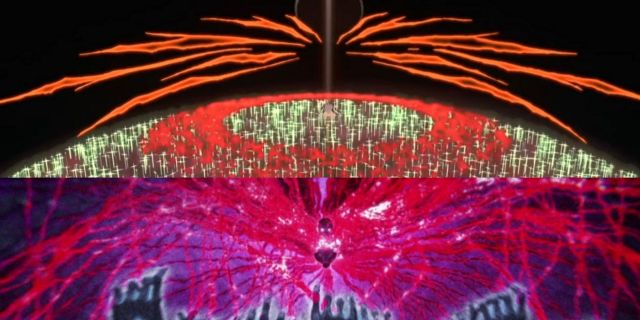Highlights
- Gainax, a groundbreaking anime studio, went bankrupt after struggles with financial troubles and leadership issues.
- Neon Genesis Evangelion and FLCL are among the iconic titles produced by Gainax in their impactful history.
- The downfall of Gainax involved scandals, lawsuits, and mismanagement, leading to the studio’s closure and legacy transfer.
Content warning: This article contains descriptions of sexual harassment and assault. If you are experiencing an unsafe workplace due to sexual harassment or assault, you can speak with someone who is trained to help. Call the National Sexual Assault Hotline at 800.656.HOPE (4673) or chat online at online.rainn.org.
Last week, on June 7, it was reported that the Japanese animation production studio, Gainax, has gone bankrupt. The studio was famous for the production of various anime titles, including the critically acclaimed sci-fi classic, Neon Genesis Evangelion, and the wacky, avant-garde and genre-defining FLCL.
The studio filed for bankruptcy in late May this year, with the public announcement of the news a week later. The news marks the closing of the doors of yet another major name in the industry following the cessation of Funimation in April this year. What is the legacy left in the aftermath of the death of the iconic anime studio?
Early History and Major Success
The Studio That Continuously Redefined Mecha

Gainax was formed by university students Hideaki Anno, Yoshiyuki Sadamoto, Yasuhiro Takeda, Hiroyuki Yamaga, Takami Akai, Toshio Okada and Shinji Higuchi as “Daicon Film” in the early 1980s. The collective’s first project was for the 20th Annual Japan National SF Convention, submitting a short animated film about a girl who fights monsters and mecha from early science fiction IPs like Ultraman, Gundam, Star Trek and more. The studio didn’t really garner much attention until the 22nd convention, where they submitted an update of their first short which combined far more elements from various genres and media.
The studio name was changed to “Gainax” in 1985, based on a Tottori Prefecture term for “giant”, with an “-x” at the end. Royal Space Force: The Wings of Honneamise(1987) was the studio’s first commercial project, which went on to be a critically acclaimed anime film classic. The studio’s next major success was the Gunbuster OVA (1988), which gave Gainax the means to produce other classics like the Nadia: The Secret of Blue Water anime series, released in 1990. 1995 saw the production of the studio’s most successful project to date, Neon Genesis Evangelion.
|
10 Titles Produced By Gainax (1984-2024) |
|
|
Title |
Year |
|
Royal Space Force: The Wings of Honnêamise |
1987 |
|
Gunbuster |
1988 |
|
Appleseed |
1988 |
|
Nadia: The Secret of Blue Water |
1990-91 |
|
Neon Genesis Evangelion |
1995 |
|
FLCL |
2000 |
|
Cutie Honey |
2004 |
|
Tengen Toppa Gurren Lagann |
2007 |
|
Panty & Stocking with Garterbelt |
2010 |
|
Medaka Box |
2012 |
The Financial Troubles
An Unshakable Curse

However, in the wake of the series’ success, Gainax would be audited on suspicion of tax evasion, with it later being revealed that the studio hid around ¥1.56 billion (just under 10 million USD) worth of income earned between the release of Evangelion and July 1997. The then president, Takeshi Sawamura and tax accountant Yoshikatsu Iwasaki were arrested in July 1999. One of the Gainax founders, Yasuhiro Takeda, wrote in the tell-all book titled The Notenki Memoirs: Studio Gainax & The Men Who Created Evangelion, that the actions of Sawamura were done in response to the constant precarity of the studio’s financial situation.
Sawamura understood our financial situation better than anyone, so when
Evangelion
took off and the money really started rolling in, he saw it as possibly our one and only opportunity to set something aside for the future. I guess he was vulnerable to temptation at that point, because no one knew how long the
Evangelion
goose would keep laying golden eggs. I don’t think he purposely set out with the goal of evading taxes. It was more that our level of accounting knowledge wasn’t up to the task of dealing with revenues on such a large scale.– Yasuhiro Takeda
In 2011, Gainax was sued by American multimedia distributor A.D. Vision for a breach of contract stemming from the former’s refusal to accept payment for an option agreement for perpetual rights to produce a live-action Evangelion. This cost them the chance to produce the film with a major studio, and A.D Vision sought to be compensated with the live-action rights to the series and their accrued legal fees. In 2016, they were sued by Studio Khara (the studio founded by Evangelion director Hideaki Anno and other former Gainax employes) for ¥100 million (around 637 000 USD) in unpaid royalties owed to Anno based on an agreement that Khara would earn royalties from income received on all projects that he worked on. Anno wasn’t the only person to leave Gainax, with Studio TRIGGER, often regarded as a spiritual successor to Gainax, being founded by former Gainax employees Hiroyuki Imaishi (director, Gurren Lagan) and Masahiko Ōtsuka in 2011.
Restructuring and Leadership Problems
The Beginning of the End

Gainax Representative director Tomohiro Maki was appointed in October 2019, had been a board director since 2015, as well as the head of Gainax International, a subsidiary that trained voice actors and other talents. However, in December of that year, Maki was accused of committing indecent acts against an aspiring voice actress (who was a minor) and was sentenced to 2.5 years in prison. The incident also saw the resignation of other board members and the company’s auditor in December 2019. Maki was replaced by Groundworks representative director Yasuhiro Kamimura later that same month.
Hideaki Anno’s Khara distanced itself from Gainax after the incident, and the Evangelion director detailed various reasons why, criticizing the management structure in place at Gainax for enabling someone like Maki to become representative director in the first place. Various business dealings and the establishment of subsidiaries continued without communication with Anno or Khara. Although Anno was a founder and a company representative on paper, he remained uninvolved in the management side of the company. In fact, at the time of Evangelion’s production, a sense of precarity regarding Gainax’s future had Anno considering taking its production elsewhere, and only three Gainax staff members were continuously working on the project, with most of the work going to Tatsunoko Production.
Soiled Relationships
The Undoing of Studio Gainax

“I am disappointed, not as a manager at a company that lent them money, but as a friend from our university days,” he wrote. “And my biggest disappointment is that I’ll never be able to regain the relationship with them that I had in those days gone by.”
– Hideaki Anno
Evangelion’s success was unprecedented, and yet the production staff did not earn much beyond the initial commission fee. Anno had to negotiate deals so that the production staff could see some of that money, and as was normalized years prior, production staff were never informed about management decisions. Various merch deals were set up, but most of the money went into bad investments. The delineation between production and management meant that Anno, a representative and founder of the company, only found out about the 1999 tax evasion case after the fact. Despite these factors, he still had a good relationship with Gainax when he formed Khara, and allowed them to keep the merch rights to Evangelion, while Anno would earn royalties from all the projects that he was involved in as creator/director.
Despite this deal, various bad decisions led to Gainax not paying the money they owed Khara. Anno received no explanation about what was happening, and in 2014, Gainax even desperately requested ¥100 million from him to avoid bankruptcy. Anno granted the loan on the condition that Gainax transferred the rights to handle merch and royalties a year earlier than they initially planned. As mentioned previously, this loan was not paid back, and beyond that, Gainax sold the rights to Gunbuster, FLCL, and even secretly sold production materials. Anno sued and won. To this day, no representatives have apologized. The result of various bad decisions, dishonesty, and the assignment of leadership to the wrong people led to the end of a studio that had a firm hand in shaping the anime medium as we know it. Gainax’s trademark has been transferred to Khara, who will assist in the transferring of the defunct studio’s properties to new owners.
Sources: ANN, Crunchyroll











Leave a Reply